高二英语选修7unit4 sharing reading教案
人教新课标高二英语选修七教案:Unit4+Sharing+课文解析.doc

人教新课标高二英语选修七教案:Unit4+Sharing+课文解析.doc课文解析1. I know you’re dying to hear all about my life here. 我知道你一定很想知道我在这里的生活。
(P29)【要点提示】(be) dying to do sth. / for sth. 渴望,极想做某事/ 得到某物。
例如:I’m dying to know what happened. 我很想知道发生了什么事。
I’m dying for a glass of water. 我真想喝杯水。
2. I’ve included some photos which will help you picture the places I talk about. 我在信里附上了一些照片,看着它们你就应该能想象出来我所说的那个地方是个什么样子了。
(P29)【要点提示】picture n. 描绘,头脑中的情景、情形。
例如:I have a vivid picture of my grandfather smiling down at me when I was very small. 我清楚地记得很小的时候祖父向我低头微笑的情景。
Just a few years ago, the picture was very different.几年前,情况大不相同。
vt. 想象,描述。
例如:We found it hard to picture him as the father of teenage sons. 我们很难想象他居然是有几个十几岁儿子的父亲了。
【归纳拓展】picture sb. / sth. as ...把某人/ 某物想象/ 描绘成……; picture sb. doing sth. 想象某人在做某事。
3. They believe that any leftovers attract evil spirits in the night so the food is dried up in the can and the can is then thrown out of the hut.他们认为剩菜剩饭在晚上会吸引邪灵,所以把食物在罐子里弄干,然后把罐子扔到屋外。
高中选修7 Unit 4 Sharing 第一课时说课稿

Senior 2 Book 7 Unit 4 SharingThe First Period说课稿――姓名一、说教材1、教材的地位与作用本单元以Sharing为话题,旨在通过单元教学,使学生了解世界上很多地方依然很落后,从而懂得同情,学会分享。
结合针对短文话题的探讨激发学生的国际意识,通过各种渠道力所能及地为贫困地区的孩子做出自己贡献。
2、教学目标的确定○1知识目标:Improve the students’ listening ability by listening to Dr Mary Murray’s experience as a volunteer with Medecins Sans Frontieres (MSF)○2能力目标:1、Learn to predict what will be heard. 2、Help the students understand time expressions and use them○3情感目标:通过单元教学,使学生了解世界上很多地方依然很落后,从而懂得同情,学会分享。
3、教学重点、难点教学重点:Learn to make notes while listening to the material and number the events in the order they are heard.教学难点:Learn to use time expressions and work together with a partner to describe a person’s experie nce..4、对教材的处理在认真分析课本和学生听力的基础上,课堂上,首先,我和学生进行面对面的谈话交流,以问题的形式引出新课,点出本课的学习主题(sharing)。
然后播放录音给学生听,学生在听后完成相应练习题目。
最后,教师在总结归纳中再次对学生进行思想情感的教育,教育学生在生活和学习中学会与他人分享,学生帮助他人,使本节课的学习任务得到升华。
高二英语选修七_Unit4_Reading名师教学设计
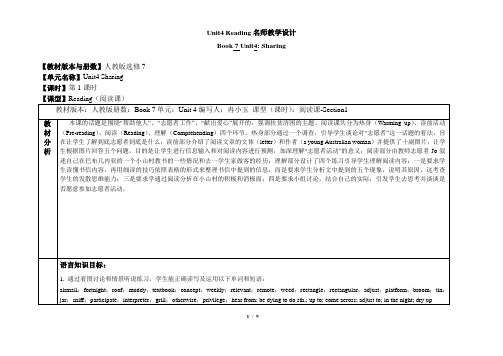
Unit4 Reading名师教学设计Book 7 Unit4: Sharing【教材版本与册数】人教版选修7【单元名称】Unit4 Sharing【课时】第1课时1/ 92/ 9【本课时教学设计】3/ 9DELC 2获取新知识Step2Pre-Reading(读前)(6 mins)1. Teacher asks students a moral question and guide thestudents to skim the text and discuss with students what thevalue of such a website would be.(3 mins)T: Is it right for some members of society to get extra helpbecause they have a disability?S: (Group discussion and give answers)T: “Family Village” is a website offering the disabled acommunication opportunity in the Internet. Do you think itbeneficial to the disabled people?2. Teacher asks the Ss to predict the content of the text byinferring from the title and picture.(3mins)T: Please glance at the title and picture. Can you guess whatkind of information would be included in disabled students’story?(make a list on the board of possible topics)S: Make predictions.1.关于残疾人是否应该得到更多的帮助这个话题的讨论为引入阅读文本的背景知识进行铺垫: 让学生更加了解这个网站的存在意义和价值。
高中选修7 Unit 4 Sharing 第一课时教案
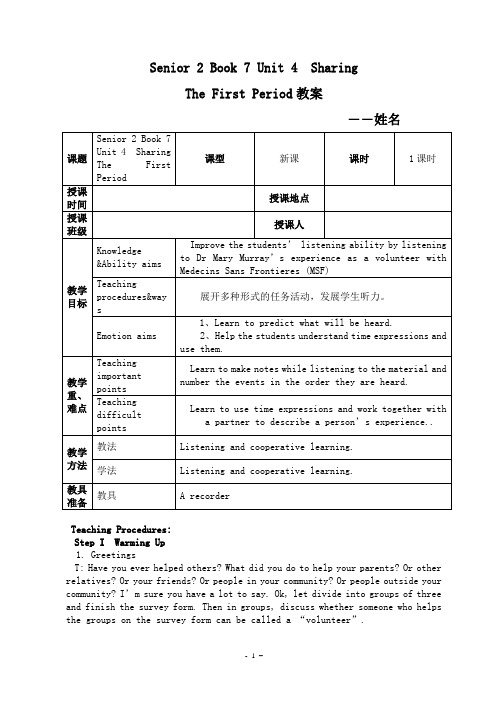
Senior 2 Book 7 Unit 4 SharingThe First Period教案――姓名Teaching Procedures:Step I Warming Up1. GreetingsT: Have you ever helped others? What did you do to help your parents? Or other relatives? Or your friends? Or people in your community? Or people outside your community? I’m sure you have a lot to say. Ok, let divide into groups of three and finish the survey form. Then in groups, discuss whether someone who helps the groups on the survey form can be called a “volunteer”.Step II Listening(I)(The teacher plays the tape and the students listen to it.)T: Now let’s check the answers of Exercis e 1 and 2.(The students will answer the questions)T: Now let’s listen to the dialogue for a second time. When you are listening, you can check the answers of Exercise 2 and finish Exercises 3 and 4. Learn to make notes about Mary’s experiences in the ta ble on Page 35. And share your notes with your partner and then with other groups.(The students will makes notes, and share their notes.)T: Ok, let’s listen to it for a third time to check the notes.Step III Listening(II)T: Perhaps you may wonder, because we are students, what we can do to help. That is, what can we do to serve communities outside the school? Ok, let do LISTENING in the workbook on Page 70. You are also required to predict what you will hear, according to the four questions.Step V AssignmentT: Boys and girls, today we have listened to two materials about giving help to others. I do hope all of us will help those who need help. Besides, you should learn to predict what you will hear before listening and pay attention to the time expressions while listening.Step VI Homework1. Finish the LISTENING TASK on Page 75-76. Remember to predict what you will hear according to the given information and also pay attention to time expressions.2. Google for more information about MSF and share it between us.。
高二英语人教课标选修7Unit4Sharing教案.doc1
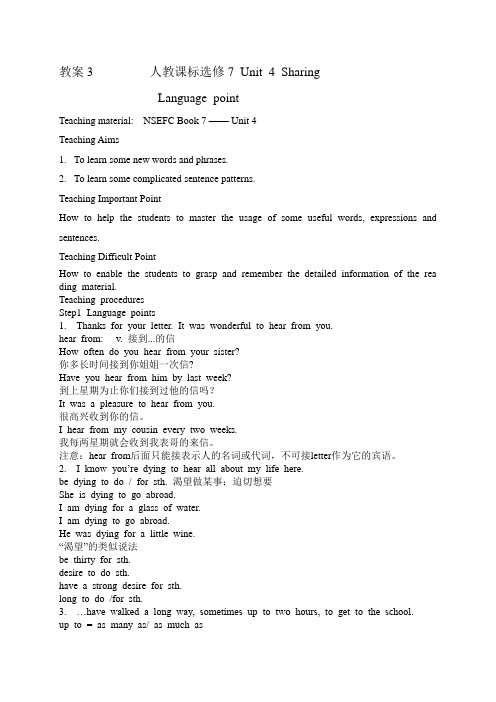
教案3 人教课标选修7 Unit 4 SharingLanguage pointTeaching material: NSEFC Book 7 —— Unit 4Teaching Aims1.To learn some new words and phrases.2.To learn some complicated sentence patterns.Teaching Important PointHow to help the students to master the usage of some useful words, expressions and sentences.Teaching Difficult PointHow to enable the students to grasp and remember the detailed information of the rea ding material.Teaching proceduresStep1 Language points1. Thanks for your letter. It was wonderful to hear from you.hear from: v. 接到...的信How often do you hear from your sister?你多长时间接到你姐姐一次信?Have you hear from him by last week?到上星期为止你们接到过他的信吗?It was a pleasure to hear from you.很高兴收到你的信。
I hear from my cousin every two weeks.我每两星期就会收到我表哥的来信。
注意:hear from后面只能接表示人的名词或代词,不可接letter作为它的宾语。
2. I know you’re dying to hear all about my life here.be dying to do / for sth. 渴望做某事;迫切想要She is dying to go abroad.I am dying for a glass of water.I am dying to go abroad.He was dying for a little wine.“渴望”的类似说法be thirty for sth.desire to do sth.have a strong desire for sth.long to do /for sth.3. …have walked a long way, sometimes up to two hours, to get to the school.up to = as many as/ as much asHe can earn up to $50,000 a year.up to 还可以表示1)be up to sth = be busy doing sth. 忙于2)It is up to sb to do sth 由某人负责做某事3)一直She lived at home right up to / until she got married.What are these naughty boys up to?It is up to me to do this task.I am not sure if she is really up to that job.4. I’m still trying to adapt to these conditions but, one thing is …adapt (oneself) to 适应,适合The new students are very slow to adapt to the rules.新生对于那些规定适应得很慢。
【范文】人教版高中英语选修7教案Unit 4 Sharing
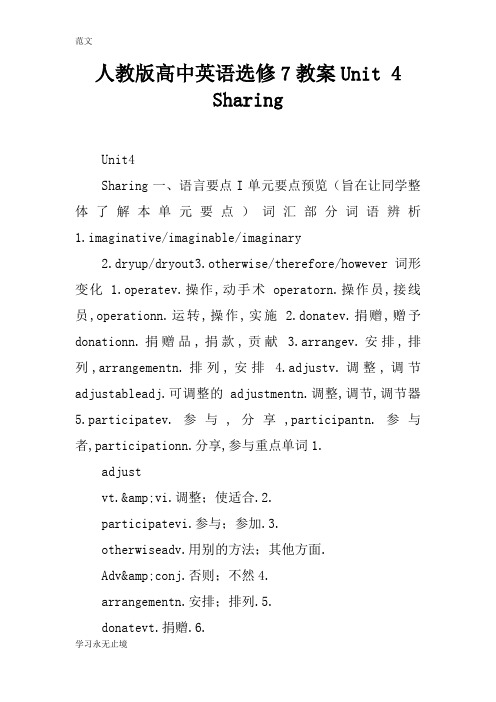
人教版高中英语选修7教案Unit 4SharingUnit4Sharing一、语言要点I单元要点预览(旨在让同学整体了解本单元要点)词汇部分词语辨析1.imaginative/imaginable/imaginary2.dryup/dryout3.otherwise/therefore/however词形变化 1.operatev.操作,动手术operatorn.操作员,接线员,operationn.运转,操作,实施 2.donatev.捐赠,赠予donationn.捐赠品,捐款,贡献 3.arrangev.安排,排列,arrangementn.排列,安排4.adjustv.调整,调节adjustableadj.可调整的adjustmentn.调整,调节,调节器5.participatev.参与,分享,participantn.参与者,participationn.分享,参与重点单词1.adjustvt.&vi.调整;使适合.2.participatevi.参与;参加.3.otherwiseadv.用别的方法;其他方面.Adv&conj.否则;不然4.arrangementn.安排;排列.5.donatevt.捐赠.6.purchasevt.&n.买;购买.7.distributionn.分配;分发;分布状态.8.relevantadj.有关的,相应的9.operatev.操作,运转,开动,起作用重点词组dyingto.极想;渴望.theotherday几天前stickout.伸出inneed.在困难中;在危急中.重点句型1.whenIreachtheschoolgroundstherearelotsof “goodmorning”formefromtheboys.2.youaskedwhetherI’mgettingtoknowanylocalpeople.3.Thegiftcoversthecost ofexercisebooksandtextbooksforcommunityprimaryschoo lsthatoperateinpoororremotevillages.重点语法限制性定语从句II词语辨析1).imaginative/imaginable/imaginaryadj.【解释】imaginative富有想象力的,创新的imaginable可想象得到的imaginary想象中的,虚构的【练习】选择imaginative/imaginable或imaginary并用其适当的形式填空1)Althoughthemaincharactersinthenovelaresotruetolif e,theyare_______.2)It’s_______forsuchan_______writertocreate_______storie s.3)Thisistheonlysolution_________.4)Thefamouspoemwasfroman______poet.keys:1)imaginary2)imaginable;ima ginative;imaginary3)imaginable4)imaginative2).dryup /dryout【解释】dryup使完全变干;(河流,湖泊等)干涸dryout变干,干透【练习】选择dryup或dryout,并用其适当的形式填空1)Thefarmerspumpedwatertotheirfieldstostopthesoil__ ______.2)Thepool________inthelateautumn.3)Thevillag ershadtowaitforthesunto_________thedirtroad.4)Don’tleavethevegetableonthetable,oritwill________.keys: 1)dryingout2)driesup3)dryup4)dryout3)otherwise/ther efore/however【解释】otherwise否则;不然thereforeadv.因此,所以however无论如何,可是【练习】选择otherwise/therefore或however并用其适当的形式填空1)Hedidn'tworkhardatEnglish_______hewouldn'tfinditd ifficulttolearnnow.2)wedonothaveenoughmoney._____ ____wecannotaffordtobuythenewcar.3)Thefirstpartwas easy;thesecond,________,tookhours.4)Heisnoisy,but________aniceboy.5)weweregoingtoplayfootball,butitwassohotthatwedecidedtodo_____________.keys:1 )otherwise2)Therefore3)however4)otherwise5)otherwiseIII词性变化(旨在提供语法填空所需材料)1.operatev.操作,动手术operatorn.操作员,接线员,operationn.运转,操作,实施2.donatev.捐赠,赠予donationn.捐赠品,捐款,贡献 3.arrangev.安排,排列,arrangementn.排列,安排 4.adjustv.调整,调节adjustableadj.可调整的adjustmentn.调整,调节,调节器5.participatev.参与,分享,participantn.参与者,participationn.分享,参与【练习】根据句子结构,用括号内所提供词的适当形式填空1)Theyencouragedthe_______to_______inthesingingperf ormanceafterthecontest..2)Thedoctorare________onan______ofafactorywhogotinjuredwhen_______amachine,and the________issaidtolastovertenhours.3)Theseatsinthe planeare________,andyoucan________themtoacertainang le.The______isnotdifficulttomake.4)Thedrinkswere________tothembycocacolacompanyandtheyreceived_______f romothercompaniesaswell.5)ourdepartmentwillbeinchar geof_______theconference.wouldyoupleasegiveussomesu ggestionsonthe_______forit?keys:1)participants;part icipate2)operating;operator;operating;operation3)ad justable;adjust;adjustment4)donated;donation5)arran ging;arrangementIV重点词汇(旨在提供综合运用所需材料)1.adjustvt.&vi.调整;使适合.[重点用法]adjustmentn.调整;修正adjustableadj.可调节的;可调整的adjust使适应;适应。
人教版高中英语选修7《Unit 4 Sharing Reading A letter home》教学设计
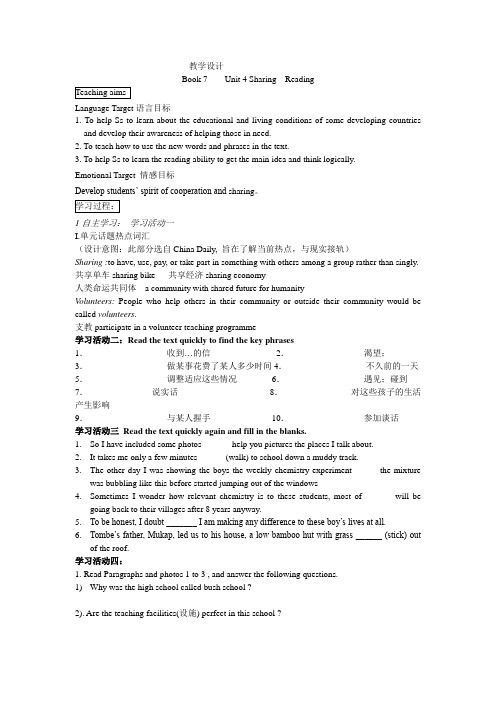
教学设计Book 7 Unit 4 Sharing ReadingLanguage Target语言目标1. To help Ss to learn about the educational and living conditions of some developing countries and develop their awareness of helping those in need.2. To teach how to use the new words and phrases in the text.3. To help Ss to learn the reading ability to get the main idea and think logically.Emotional Target 情感目标Develop students’ spirit of cooperation and sharing。
1自主学习:学习活动一I.单元话题热点词汇(设计意图:此部分选自China Daily, 旨在了解当前热点,与现实接轨)Sharing :to have, use, pay, or take part in something with others among a group rather than singly. 共享单车sharing bike 共享经济sharing economy人类命运共同体 a community with shared future for humanityVolunteers:People who help others in their community or outside their community would be called volunteers.支教participate in a volunteer teaching programme学习活动二:Read the text quickly to find the key phrases1.________________收到…的信2.________________ 渴望;3.________________ 做某事花费了某人多少时间4.________________ 不久前的一天5.________________ 调整适应这些情况6.________________ 遇见;碰到7._____________ 说实话8.________________对这些孩子的生活产生影响9.________________ 与某人握手10.________________ 参加谈话学习活动三Read the text quickly again and fill in the blanks.1.So I have included some photos ______ help you pictures the places I talk about.2.It takes me only a few minutes ______(walk) to school down a muddy track.3.The other day I was showing the boys the weekly chemistry experiment _____ the mixturewas bubbling like this before started jumping out of the windows4.Sometimes I wonder how relevant chemistry is to these students, most of ______ will begoing back to their villages after 8 years anyway.5.To be honest, I doubt _______ I am making any difference to these boy’s lives at all.6.Tombe’s father, Mukap, led us to his house, a low bamboo hut with grass ______ (stick) outof the roof.学习活动四:1. Read Paragraphs and photos 1 to 3 , and answer the following questions.1)Why was the high school called bush school ?____________________________________________________________________2). Are the teaching facilities(设施) perfect in this school ?_____________________________________________________________________3). Why was science the most challenging subject for Job ?4). Why did the boys started jumping out of the windows ?____________________________________________________________________________3.Read Paragraphs 7-9 and choose the best answer.1. Why did Tombe throw out the tin can?A. Because he believed the can attracted evil spirits.B. Because he believed any leftovers attracted evil spirits.C. Because he believed the can has no use at all.D. Because he believed the grill attracted evil spirits.2. How did Jo feel after the visit to Tombe’s family?A. Happy.B. Sad.C. Worried.D. Upset.学习活动五:According to the details above, try to find out the main idea of the letter.The main idea:。
(完整版)人教版高中英语选修7《Unit4Sharing》教案

2016 全新精品资料-全新公文范文-全程指导写作 –独家原创 5 / 10
The shortest way to do many things is
★精品文档★ 在考试时一定要注意,你写的所有内容都要切合题意。
联想拓展 relevance n. 关联;相关性 have relevance to 与。有关 have no relevance to=have nothing to do with 与。无关 What you say has no relevance to the subject. 你所说的与主题无关。 高手过招 单项填空 Topics for compositions should be to the experiences and interests of the students. (2016•01•浙江宁波检测) A. Concerned B. dependent C. concerning D. Relevant 解析:选 D。句意为:作文的题目应与学生的经历和兴 趣有关。be relevant to 与。有关;而 concerning 是介词, 相当于 about,后面不加 to。 2. adjust vt.&vi.调整;使适合 I usually adjust my watch before I go to work
2016 全新精品资料-全新公文范文-全程指导写作 –独家原创 2 / 10
人教版高二英语选修7_Unit_4_Sharing_全单元教案
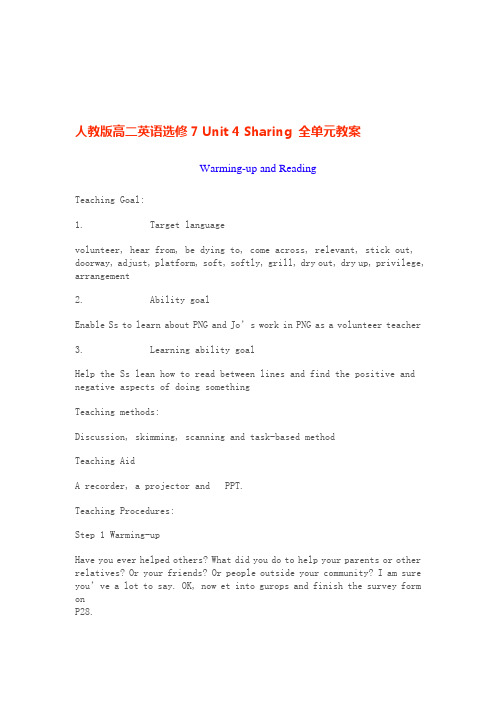
2.________ was dying to hear all about Jo’s life in PNG.
3._______ walked a long way to get to school.
4.___________ didn’t have any textbook.
Teaching methods:
Discussion, skimming, scanning and task-based method
Teaching Aid
A recorder, a projector and PPT.
Teaching Procedures:
Step 1 Warming-up
Have you ever helped others? What did you do to help your parents or other relatives? Or your friends? Or people outside yourcommunity? I am sure you’ve a lot to say. OK, now et into gurops and finish the survey form on P28.
5._____ becamea lot more imaginative when teaching.
6._____ started jumping out the windows during a chemistry experiment.
7.________ visited a village that was the home of one the boys, Tombe.
2019年春高二英语(人教新课标)选修七教案:Unit4 Sharing reading

Unit4 SharingPeriod Two Reading教案I. Teaching aims:1. Enable the S s to learn more information about Jo’s job and the conditions of her teaching.2. Know more about the customs of local people.3. Discuss how you would do if you were a volunteer working in that area.4. Get more reading skills.II. Teaching procedure:Step 1: pre-reading:Give two questions:What was Jo’s job in PNG?What kind of students were in her class?Step2: Fast reading1. Jo is a young Australian women.2.Rosemary was dying to he ar all about Jo’s life in Papua New Guinea.3. The boys walked a long way to get to the school.4. The boys and Jo didn’t have any textbooks.5. Jo became a lot more imaginative when teaching.6. The boys started jumping out the windows during achemistry experiment.7. Jenny and Jo visited a village that was the home of one of the boys, Tombe.8. Kiak started crying “ieee ieee” to welcome them9. Mucap led us to a low bamboo hut.10. Kiak was going to share the platform with Jenny and Jo.11. Tombe’s famil y softly talked to each other in their language Jo didn’t understand.Step3. Do the judgement. (True or false according to the text) 1. The classrooms are made of bricks and the roofs of grass.(F)2. It always takes the boys only a few minutes to get to the school.(F)3. Science is the most challenging subject for Jo.(T)4. When Jo and Jenny arrived at the village,they shook hands with all the villagers.(T)5. Tombe threw out the tin can because it’s very dirty.(F) Step4. Skimming and then answer the following questions: 1.Why did Jo send Rosemary some photos?It’s difficult for Rosemary to imagine how life was hard / different in Jo’s ---2. Why was the high school called a bush school?The classroom were madeof bamboo and the roofs were made of grass.3. Were the boys and villagers friendly to Jo? How do you know?Lots of “good mornings” ; cry “ ieee ieee” ; shake hands4. Why was Science the most challenging subject for Jo? There was no equipment.5. Why did the boys start jumping out the window?The boy never came across something like bubbling mixture 6. Why should it take Jo and Jenny two and a half hours to get to the village?They had to climb up a mountain to a ridge first and then down a steep path to the valley.Step5. Scanning and then anylize the structure of the text.Try to give the right order according to the contents of the text. 2A .The condition of the school.1B An introduction.4C. The ending3D. A visit to a local family.A. We had a meal and I saw a strange custom.B. The experiment frightened the boys.C. I am glad to receive Rosemary’s letter and I’ve included some photos.D. I left and I felt privileged.E. I saw the poor condition of the room.F. It’s a bush school and the students live far away.Step6. Detailed readingRead paragraph 1-3 and finish the questions1.Why does Jo call the high school a “bush school”2.Were the boys friendly to Jo? How do you know?3.How long does it take the students to go to school?4.Why was science the most challenging subject for Jo?5.Why did the boys start jumping out of the windows?6.Why does Jo wonder how relevant chemistry is to the kids? Read paragraph 1-3 and finish the questions1.Why does Jo call the high school a “bush school”Because the classrooms are made from bamboo and the roofs from grass.2.Were the boys friendly to Jo? How do you know?There are a lot of “good mornings” for Jo from the boy s.3.How long does it take the students to go to school? Sometimes up to 2 hours4.Why was science the most challenging subject for Jo? There was no equipment.5.Why did the boys start jumping out of the windows?The boys never came across anything like the bubbling mixture.6.Why does Jo wonder how relevant chemistry is to the kids? Because most of the boys will go back to their villages after year 8 and she thinks chemistry may make little difference to the kids’ life.Step7. ComprehendingWhat have you learned about the customs and lives of the people in Tombe’s village? Read Jo’s letter and look at herphotos. Then complete the table below:。
人教版高二英语选修七Unit4 Sharing教案设计
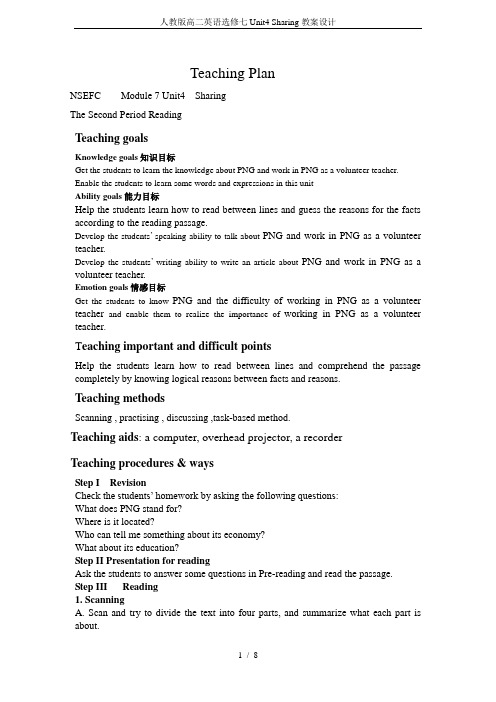
Teaching PlanNSEFC Module 7 Unit4 SharingThe Second Period ReadingTeaching goalsKnowledge goals知识目标Get the students to learn the knowledge about PNG and work in PNG as a volunteer teacher. Enable the students to learn some words and expressions in this unitAbility goals能力目标Help the students learn how to read between lines and guess the reasons for the facts according to the reading passage.Develop the students’ speaking ability to talk about PNG and work in PNG as a volunteer teacher.Develop the students’writing ability to write an article about PNG and work in PNG as a volunteer teacher.Emotion goals情感目标Get the students to know PNG and the difficulty of working in PNG as a volunteer teacher and enable them to realize the importance of working in PNG as a volunteer teacher.T eaching important and difficult pointsHelp the students learn how to read between lines and comprehend the passage completely by knowing logical reasons between facts and reasons.Teaching methodsScanning , practising , discussing ,task-based method.Teaching aids: a computer, overhead projector, a recorderTeaching procedures & waysStep I RevisionCheck the students’ homework by asking the following questions:What does PNG stand for?Where is it located?Who can tell me something about its economy?What about its education?Step II Presentation for readingAsk the students to answer some questions in Pre-reading and read the passage.Step III Reading1. ScanningA. Scan and try to divide the text into four parts, and summarize what each part is about.B. help the students to master the basic forms of a letter writing.2.Careful readingRead paragraphs 2-7 and then do the exercise.Step IV PracticeA.Find words in the passage that have the following meaning.B.Learn the following words or phrases by heart and complete the paragraph.stick out, come across, hear from, platform,(be) dying toStep V Post-readingDeveloping : I. guessingGuess the reasons for the facts according to the reading passage.Developing : II. discussionAsk the students to discuss the following question in group:Why do you think Jo became a volunteer in PNG?(Give as many possible reasons as you can.)Give the students a sample of the discussions :A: I think, first of all, Jo was a kind-hearted woman, who is willing to help others. Second, she knew enough about the poor conditions in PNG and thought that she could help teach in the schools. If I am given the chance, I will do whatever I can to help.B: In my opinion, Jo must have worked as a teacher in Australia, and she applied to become a volunteer abroad, and then she was sent to PNG as a volunteer.C: Maybe she thinks that education is the key to solving all the problems in PNG, so she, as a teacher, goes to PNG to help.Homework1. Finish Exercise 3 on Page 31.2. Read the passage again after class and find all the attributive clauses in it.3.Recite the key sentences in the text.教学流程图:Recite the following phrases and sentences after class:1.stick out 伸出e across 偶然发现或遇到;碰见3.hear from 接到……的信4.(be) dying to 极想;渴望5.in need 在困难中6.adapt (oneself) to 适应,适合7.for sure肯定如此,毫无疑问8.make a difference有关系;起(重要)作用9.dry up(河流,湖泊)干涸;(使)枯竭10.dry out(使)变干;(把)弄干11.adjust to 适应12.in the night在夜间1). I know you’re dying to hear all about my life here.2). I’ve included some photos which will help you picture the places I talk about.3). Tombe’s father, mukap, led us to his house, a low bamboo hut grasssticking out of the roof----this shows it’s a man’s house.4). When I reach the school grounds there are lots of “good mornings”for me from the boys, many of whom have walked a long way, sometimes up to two hours, to get to the school.5). In fact , I wonder if you could post this letter for me.。
选修7unit4sharing单元教案

选修7U n i t4S h a r i n g单元教案-CAL-FENGHAI-(2020YEAR-YICAI)_JINGBIANUnit4 sharing本单元的话题是Sharing,主要涉及帮助弱者、志愿服务、合作分享等。
通过听、说、读、写等各种活动学习相关的语言知识,使学生了解世界上很多地方依然很落后,从而懂得同情,学会分享。
了解一些志愿者工作的信息,培养学生互助合作的精神和社会责任感。
结合针对短文话题的探讨激发学生的国际意识,通过各种渠道力所能及地为贫困地区的孩子作出自己的贡献。
二.课时划分在对本单元的各部分材料进行分析、整合后,确定了以下六个阶段:Period 1 Word StudyPeriod 2 Warming- up & Pre- readingPeriod 3 Reading & ComprehendingPeriod 4 GrammarPeriod 5 Using LanguagePeriod 6 Composition三.教学目标1.语言知识目标:(1)学生能够正确读写及运用以下单词:airmail;fortnight;roof;muddy;textbook;concept;weekly;relevant;remote;weed;rectangle;rectangular;adjust;platform;broom;tin;jar;sniff;participate;interpreter;grill;otherwise;privilege(2)学生掌握下列词组的意思并能在句子中熟练运用:hear from;(be)dying to;the other day;dry out;dry up2.语言技能目标:(1)强化略读、查读等阅读技能,训练通过寻找关键词、主题句等方式更快速并准确地确定文章的段落大意,理清文章的总体框架与脉络的技能。
(2)继续运用已经掌握的基本猜词技巧猜测文章中的部分单词。
人教新课标高二英语选修七教案:Unit4+Sharing+reading.doc
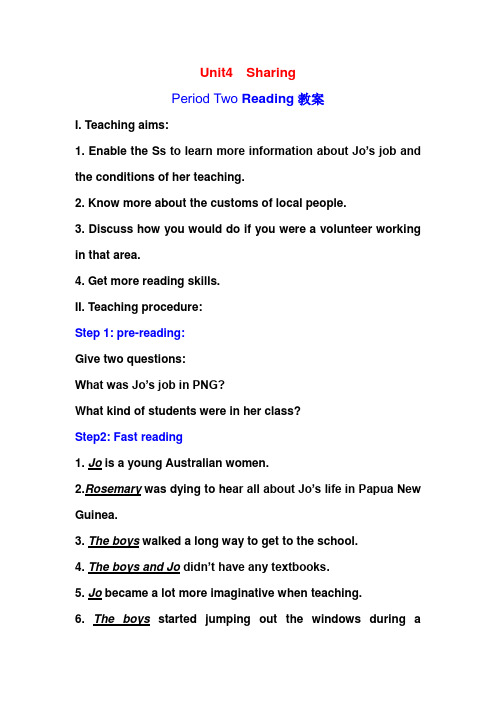
Unit4 SharingPeriod Two Reading教案I. Teaching aims:1. Enable the S s to learn more information about Jo’s job and the conditions of her teaching.2. Know more about the customs of local people.3. Discuss how you would do if you were a volunteer working in that area.4. Get more reading skills.II. Teaching procedure:Step 1: pre-reading:Give two questions:What was Jo’s job in PNG?What kind of students were in her class?Step2: Fast reading1. Jo is a young Australian women.2.Rosemary was dying to he ar all about Jo’s life in Papua New Guinea.3. The boys walked a long way to get to the school.4. The boys and Jo didn’t have any textbooks.5. Jo became a lot more imaginative when teaching.6. The boys started jumping out the windows during achemistry experiment.7. Jenny and Jo visited a village that was the home of one of the boys, Tombe.8. Kiak started crying “ieee ieee” to welcome them9. Mucap led us to a low bamboo hut.10. Kiak was going to share the platform with Jenny and Jo.11. Tombe’s famil y softly talked to each other in their language Jo didn’t understand.Step3. Do the judgement. (True or false according to the text) 1. The classrooms are made of bricks and the roofs of grass.(F)2. It always takes the boys only a few minutes to get to the school.(F)3. Science is the most challenging subject for Jo.(T)4. When Jo and Jenny arrived at the village,they shook hands with all the villagers.(T)5. Tombe threw out the tin can because it’s very dirty.(F) Step4. Skimming and then answer the following questions: 1.Why did Jo send Rosemary some photos?It’s difficult for Rosemary to imagine how life was hard / different in Jo’s ---2. Why was the high school called a bush school?The classroom were madeof bamboo and the roofs were made of grass.3. Were the boys and villagers friendly to Jo? How do you know?Lots of “good mornings” ; cry “ ieee ieee” ; shake hands4. Why was Science the most challenging subject for Jo? There was no equipment.5. Why did the boys start jumping out the window?The boy never came across something like bubbling mixture 6. Why should it take Jo and Jenny two and a half hours to get to the village?They had to climb up a mountain to a ridge first and then down a steep path to the valley.Step5. Scanning and then anylize the structure of the text.Try to give the right order according to the contents of the text. 2A .The condition of the school.1B An introduction.4C. The ending3D. A visit to a local family.A. We had a meal and I saw a strange custom.B. The experiment frightened the boys.C. I am glad to receive Rosemary’s letter and I’ve included some photos.D. I left and I felt privileged.E. I saw the poor condition of the room.F. It’s a bush school and the students live far away.Step6. Detailed readingRead paragraph 1-3 and finish the questions1.Why does Jo call the high school a “bush school”2.Were the boys friendly to Jo? How do you know?3.How long does it take the students to go to school?4.Why was science the most challenging subject for Jo?5.Why did the boys start jumping out of the windows?6.Why does Jo wonder how relevant chemistry is to the kids? Read paragraph 1-3 and finish the questions1.Why does Jo call the high school a “bush school”Because the classrooms are made from bamboo and the roofs from grass.2.Were the boys friendly to Jo? How do you know?There are a lot of “good mornings” for Jo from the boy s.3.How long does it take the students to go to school? Sometimes up to 2 hours4.Why was science the most challenging subject for Jo? There was no equipment.5.Why did the boys start jumping out of the windows?The boys never came across anything like the bubbling mixture.6.Why does Jo wonder how relevant chemistry is to the kids? Because most of the boys will go back to their villages after year 8 and she thinks chemistry may make little difference to the kids’ life.Step7. ComprehendingWhat have you learned about the customs and lives of the people in Tombe’s village? Read Jo’s letter and look at herphotos. Then complete the table below:Step8. Post-readingGuess the reasons for the facts according to the J o’s letter. 1. The boys jumped out of the windows in the science lesson. In the science lesson the boys were frightened by what they saw --- the mixture was bubbling over everywhere, thinking that something terrible had happened, so they jumped out of the windows to escape from danger.2. Jo wondered how relevant chemistry was to the boys. Because most of the boys will go back to their village after studying in the school, and their knowledge of chemistry will prove useless, so Jo wondered how relevant chemistry was to the boys.3. Tombe’s mother cried “ieee ieee” when he say Jo.I think it’s a kind of greeting in their village. And I’m sure all the family members will be happy and excited to have visitors like Jenny and Jo.4. There were no windows in Muka p’s hut.There were no windows in Mukap’s hut. Perhaps in this way can prevent flies, mosquitoes and other insects from coming in. Of course, if there were glass, they could both have a big window, and at the same time, they can keep all the insectsfrom entering.5. The tin can was standing upside down on the grill.The tin can was standing upside down on the grill in order to get the leftover dry up quickly.Step9. Fill in the chart:What do you think are the positive and negative things about living in a village in Papua New Guinea. The first one is done for you.Step10. Discussion in groups:1. Compare the differences between our school and the school described in the letter2. Jo felt it was a privilege to have spent a day with Tombe’s family. If you were Jo, how do you think you would have felt? Give reasons.First I think it was such a long distance from the school to Tombe’s home. Second, the family members and the villagers showed great hospitality to us, which impressed us very deeply. Third, we got the chance to know the villager’s simple life. Therefore, we were determined to go on with volunteer work to help the boys get enough education3.Why do you think Jo became a volunteer in PNG? Give asmany possible reasons as you can. Would you like to work as a volunteer in a poor area?Give reasons.Useful phrases: be willing to; do one’s bit to do; be eager to do; be full of ; work hard and endure hardship…Key words: kind-hearted; helpful; strong-mindedA sample of the discussions:A: I think, first of all, Jo was a kind-hearted woman, who is willing to help others. Second, she knew enough about the poor conditions in PNG and thought that she could help teach in the schools. IfI am given the chance, I will do whatever I can to help.B: In my opinion, Jo must have worked as a teacher in Australia, and she applied to become a volunteer abroad, and then she was sent to PNG as a volunteer.C: Maybe she thinks that education is the key to solving all the problems in PNG, so she, as a teacher, goes to PNG to help. D: Perhaps she likes traveling abroad, helping the poor wherever she goes.E: I don’t agree wit h you. You know, she stayed there for two years. A traveler once did that. She was willing to help the poor children in PNG to be educated. She was doing her bit to change the poor’s state of living and education. Ifeveryone inthe rich countries should do like her, all the problems stemming from poverty could be solved easily.F: I would like to say something about the second topic. I think I will be a volunteer in a poor area. Whenever I saw the poor living state of the poor in the western areas and mountainous areas, I was eager to do something for them. All are created equal. But they can’t get what we can enjoy. What a pity! If possible, I will try to helpStep11.Homework:Surf the Internet to find some information about the volunteers working in poor areas.精美句子1、善思则能“从无字句处读书”。
人教版高中英语选修七教案:Unit+4+Sharing+writing.doc
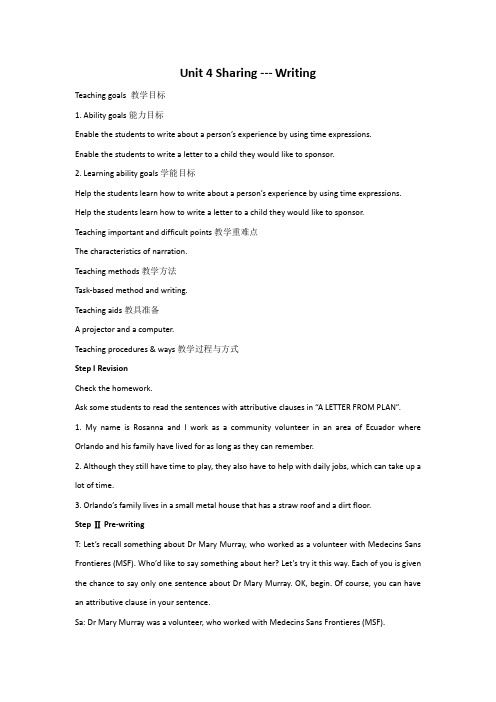
Unit 4 Sharing ---WritingTeaching goals 教学目标1. Ability goals能力目标Enable the students to write about a person’s experience by using time expressions.Enable the students to write a letter to a child they would like to sponsor.2. Learning ability goals学能目标Help the students learn how to write about a person’s experience by using time expressions. Help the students learn how to write a letter to a child they would like to sponsor.Teaching important and difficult points教学重难点The characteristics of narration.Teaching methods教学方法Task-based method and writing.Teaching aids教具准备A projector and a computer.Teaching procedures & ways教学过程与方式Step I RevisionCheck the homework.Ask some students to read the sentences with attributive clauses in “A LETTER FROM PLAN”.1. My name is Rosanna and I work as a community volunteer in an area of Ecuador where Orlando and his family have lived for as long as they can remember.2. Although they still have time to play, they also have to help with daily jobs, which can take up a lot of time.3. Orlando’s family lives in a small metal house that has a straw roof and a dirt floor.Step Ⅱ Pre-writingT: Let’s recall something about Dr Mary Murray, who worked as a volunteer with Medecins Sans Frontieres (MSF). Who’d like to say something about her? Let’s try it this way. Each of you is given the chance to say only one sentence about Dr Mary Murray. OK, begin. Of course, you can have an attributive clause in your sentence.Sa: Dr Mary Murray was a volunteer, who worked with Medecins Sans Frontieres (MSF).Sb: Dr Mary Murray once worked in clinic in both Malawi and Sudan which are developing countries in Africa.…Step Ⅲ WritingT: Very good. Now you are asked to write about Dr Murray for the school magazine. Write a paragraph on each topic below in the order shown. Remember to use time expressions listed on Page 36.1. who she is2. reasons why she joined MSF3. what she did in Malawi4. what she did in the Sudan5. the effects on her of her experiences6. her plans for the futureAfter the students have finished writing, show two samples on the screen and check the mistakes if any.Step Ⅳ Writing taskDeal with WRITING TASK on Page 75.T: Imagine that you have decided to sponsor Shan-shan, a 11-year-old girl from Gansu Province. Her family cannot afford to keep her at school. But she loves practicing English. Write a letter to her in English. In your letter, you can:Introduce yourselfSay something about your interests and hobbiesDescribe your familyLet her know you want to make friend with her and hear from herOther things you would like to tell herAfter the students have finished writing, ask several of them to read their letters.品味人生1、不管鸟的翅膀多么完美,如果不凭借空气,鸟就永远飞不到高空。
高中英语人教版选修七Unit4SharingReading教案(系列二)

选修七Unit 4 SharingPeriod 1 Reading教学设计I.单元教学目标Ⅱ.目标语言Teaching Goal:1. Target languagevolunteer, hear from, be dying to, come across, relevant, stick out, doorway, adjust, platform, soft, softly, grill, dry out, dry up, privilege, arrangement2. Ability goalEnable Ss to learn about PNG and Jo’s work in PNG as a volunteer teacher3. Learning ability goalHelp the Ss lean how to read between lines and find the positive and negative aspects of doing something Teaching methods:Discussion, skimming, scanning and task-based methodTeaching AidA recorder, a projector and PPT.Teaching Procedures:Step 1 Warming-upT: Have you ever helped others? What did you do to help your parents? Or other relatives? Or your friends?Or people in y our community? Or people outside your community? I’m sure you have a lot to say. Ok, let divide into groups of three and finish the survey form. Then in groups, discuss whether someone who helps the groups on the survey form can be called a “volunteer”.Suggested answers:T: Which one can be called a volunteer? Or what kind of things do volunteers do?S: Volunteer work includes: Be a coach of the football lovers, plant trees, help people with disabilities.Step 2 Pre-readingAsk Ss to find out PNG on the map and discuss the photos in the reading passage.Photos 1 to 31.What was Jo’s job in PNG? ( a teacher)2.What kind of students were in her class? (Teenage boys. They are poorly dressed.)3.The classroom are made with wooden poles and have bamboo walls and grass roofs (except for the newscience lab which has a metal roof). The floor has bamboo matting on it. The walls do not reach the roofs (except the walls of the science lab). There is no glass in the windows.Photos 4 to 101.The village is very small. It is by a river at the bottom of a valley. It has steep slopes all around it.2.The village huts are small. They have no windows. They are made of wood and bamboo and have grass roofs.Meals are prepared and cooked outside. One of the crops grown is peanuts. The tool used for this crop is a digging stick. There is a woman carrying a naked baby on her shoulders. She is also carrying a heavy-looking bag. She has bare feet.Step3 Reading1. ScanningScanning the text and fill the blanks with their names.1.__Jo______ is a young Australian woman.2.___Rosemary____ was dying to hear all about Jo’s life in PNG.3.School boys walked a long way to get to school.4.Jo and her student s didn’t have an y textbook.5.Jo became a lot more imaginative when teaching.6.The boys started jumping out the windows during a chemistry experiment.7.Jenny and Jo visited a village that was the home of one of the boys, Tombe.8.Tombe’s mother, Kiak started crying “ieee ieee” to welcome them.9.Tombe’s father, Mukap led us to a low bamboo hut.10.Kiak was going to share the platform with Jenny and Jo.11.Tombe’s family softly talked to each other in their language Jo didn’t understand2. Read the text carefully and finish the chart.3.detailed reading Task-based (exercises 2 and 3 in comprehending part.) Exercise 2:Exercise 3:Step IV. HomeworkSuppose you've graduated from a key university and now you are a volunteer who works in the remote region to assist the basic education there. And you are to write a letter home to introduce your present situation. (you can refer to the text).。
- 1、下载文档前请自行甄别文档内容的完整性,平台不提供额外的编辑、内容补充、找答案等附加服务。
- 2、"仅部分预览"的文档,不可在线预览部分如存在完整性等问题,可反馈申请退款(可完整预览的文档不适用该条件!)。
- 3、如文档侵犯您的权益,请联系客服反馈,我们会尽快为您处理(人工客服工作时间:9:00-18:30)。
A Letter Home
知识目标
1. Make the students know about basic information of PNG.
2. Establish the consciousness of helping others
能力目标
1.Let the students talk about the information from the photos.
2. Develop the students’ reading ability.
情感目标
1. Arouse stud ents’ great interest in being a volunteer.
2. Develop student’ sense of cooperation learning.
教学重点:
1.Talk about Jo’s experience with the target language and useful
expressions.
2.Get students to know the customs and lives of the poeple in Tombe’s
village.
3.Get students to learn different reading skills.
教学难点:
1. Develop students’ reading ability.
2.Enable students to learn to talk about being a volunte.
教学过程:
stepⅠ Greetings & Lead-in
1.Greet the students as usual.
2.A sketch played by students.
StepⅡ Warming up
1. Ask students some questions and then make a definition of volunteer Have you ever helped your parents, or other relatives, or your friends? Have you ever helped people in your community or people outside your community?
2. Show some pictures and let the students speak out what the volunteers are doing.
StepⅢ Pre-reading
1. Introduce Papua New Guinea (PNG)
2. Look at the photos from Jo and answer the following questions:
1) What was Jo’s job in PNG?
2) What kind of students ware in her class? Boys, girls, or both?
3) What were the classrooms like?
Is the classroom well equipped?
4) What can you say about the village?
StepⅣ Reading
1 Skimming
1) It was wonderful for ________ to hear from Rosemary.
2) ___________ is dying to hea r about Jo’s life there.
3) ___________ started jumping out of the window because they had never come across anything like it.
4) _____ started crying “ieee ieee” to welcome them.
5) _______ led us to his house, a low bamboo hut with grass sticking out of the roof.
6) I felt it a privilege to have spent a day with hisStudent, ________’s family.
2.Scanning
Match each part with its main idea
Part 1 A visit to a local village
(Para 1)
Part2 The end of the letter
(Para____)
Part 3 The beginning of the letter
(Para____)
Part 4 The introduction of the school and Jo’s work as a
(Para 9) teacher
3.Careful-reading
Task 1: Ask and answer
StepⅤ Post-reading
Multiple choice
StepⅥDiscussing
Would you like to work as a volunteer in a poor area?
StepⅦHomework
1. Finish Exercises on Page 3
2.
2. Read the passage again after class and find all the attributive clauses in it.。
